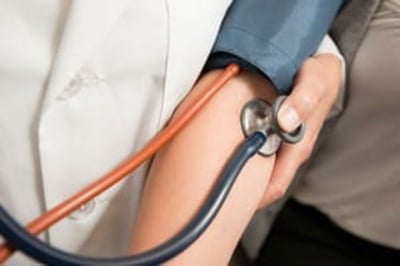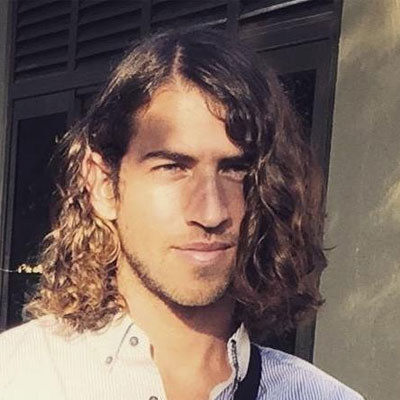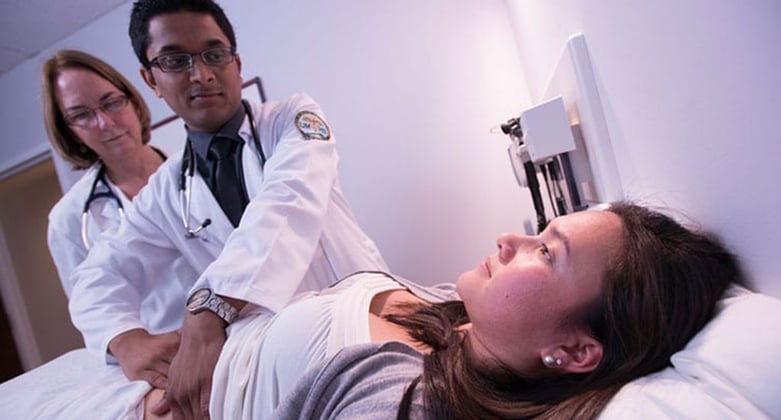If there’s one piece of advice I can give to prospective medical students, it’s seek out volunteering positions that give you patient interaction experience.
 Shadowing physicians is great, and important to understanding if the doctor lifestyle is right for you, but any experience that is putting you on the sidelines, and not developing your inter-personal and clinical confidence, is doing you a disservice.
Shadowing physicians is great, and important to understanding if the doctor lifestyle is right for you, but any experience that is putting you on the sidelines, and not developing your inter-personal and clinical confidence, is doing you a disservice.
Let me explain. There are really two parts to medical school, basic science and clinical rotations. Basic science is where you’ll learn all of your hard sciences, such as anatomy and cell biology. You’ll be in lectures and labs all day, then study until the early hours of the morning, not too much unlike pre-med. The second half of medical school is clinical rotations, where you’ll be spending all of your time in teaching hospitals, working alongside real doctors, with real patients.
(Photo, inset right above) Taking blood pressure. Photo: UMHS
For people with good study skills and time management, basic science won’t be too much of an adjustment. Sure there is more material, and longer studying hours, but historically strong students will continue to do well. Clinical rotations are a different story though. Intelligence and hard work are no longer enough to succeed. In addition to these traits, you’ll need inter-personal skills, empathy, compassion, and character to stand out from the crowd. There’s always a handful of excellent, book-smart students who are utterly shocked, and inept the second they’re put in front of a patient. Don’t let this be you!
In some cases, it’s even more important to stand out in clinical rotations than in basic science. When applying for residency, candidates are evaluated on USMLE scores and grades, but also their recommendations from clinical directors, and their interview. Often times you’ll be applying for residency at a hospital where you had a clinical rotation. Impressing these hospitals is integral to getting interviews, recommendations, and ultimately getting a residency. In speaking to recent graduates of UMHS, many believed good networking and recommendations from a strong performance in clinical rotations, outweighed USMLE scores when it came to getting their residency.
Hitting the ground running when you enter clinical rotations is so important. Students who flounder in their first few rotations are setting themselves at a huge disadvantage. Think about all of the recommendations they are missing out on, and potential negative word of mouth among hospital staff they are making for themselves.
Some Caribbean medical schools such as UMHS, have a pre-clinical fifth semester in the US. Through this hybrid half classroom / half clinical experience, we can develop your clinical skills and wean you into the US clinical setting, before releasing you completely into rotations. Although a boost, medical students need to go above and beyond when it comes to preparing for the clinical side. They should develop their clinical confidence and inter-personal skills as early on as possible, starting in undergrad or even earlier. Students who were EMT’s or nurses are among my favorite, and are almost guaranteed to be rock stars once they get into the clinical setting.
Unless you plan on being a researcher, the life of a doctor is the life of a clinician. Even then, you’ll still have to succeed in the clinical side of medical school. When preparing for your medical education, realize academic intelligence is just one piece of the equation. Social intelligence and confidence are things you can’t learn from a book. If you feel you’re lacking in these traits, make it a priority to get in front of people. Look for volunteer positions that allow you to spend time with patients. Not only will you build up your resume for medical school, but you’ll be developing essential skills to succeed.
(Top photo) UMHS students in their pre-clinical training during 5th semester. Photo; UMHS
About UMHS:
Built in the tradition of the best US universities, the University of Medicine and Health Sciences focuses on individualized student attention, small class sizes and recruiting high quality faculty. For these reasons, UMHS is quickly becoming the school of choice among Caribbean medical schools.

Ryan is the Director of Marketing at UMHS. He holds a Masters in Public Health from the University of Southern California and a BA in Marketing from the University of Maryland, College Park. He is also a musician an avid outdoorsman.
















